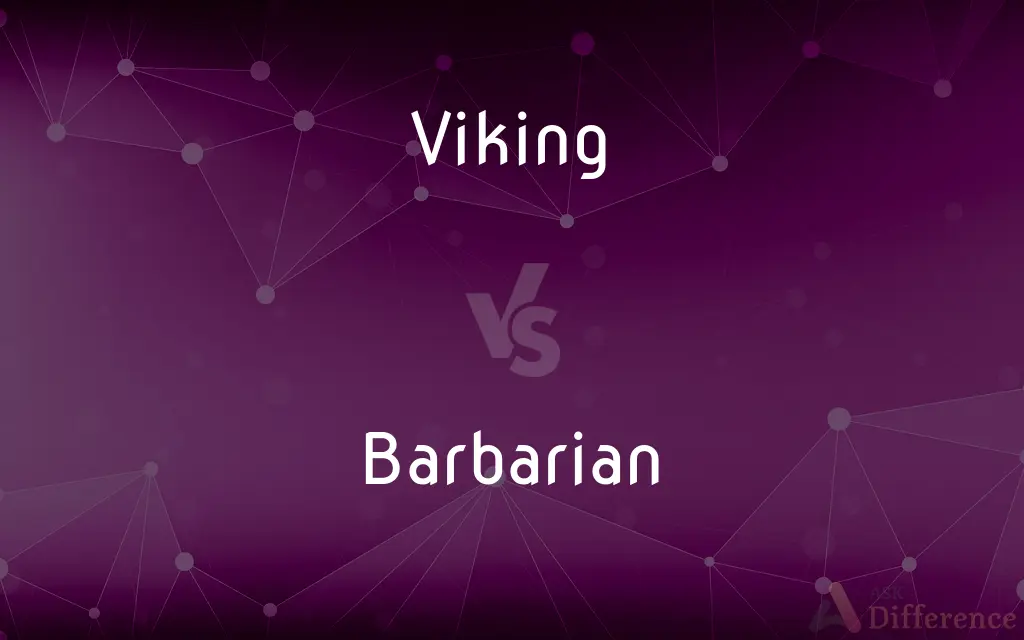Viking vs. Barbarian — What's the Difference?
By Tayyaba Rehman — Updated on October 26, 2023
Vikings were seafaring Norse people from late eighth to early 11th century Scandinavia. Barbarians is a term used historically by Greeks and Romans to describe non-Greek and non-Roman people or cultures, often pejoratively.

Difference Between Viking and Barbarian
Table of Contents
ADVERTISEMENT
Key Differences
Vikings refer specifically to the seafaring people from the late eighth to the early 11th century originating from Scandinavian regions. These Norse people are particularly known for their explorations, raids, and trading throughout large parts of Europe. Barbarians, on the other hand, is a broader and often derogatory term historically utilized by the Greeks and later by the Romans to label tribes or cultures that were foreign or non-civilized to them.
While Vikings had a definite geographical and cultural origin, the term "barbarian" was not limited to one specific group or region. Any tribe or group that didn't conform to the Greek or Roman way of life, including the Huns, Vandals, and many others, could be referred to as barbarians. Thus, while Vikings were a specific group, the Barbarians encompassed a vast array of different tribes and people.
The Vikings, throughout their existence, left a significant mark on European history. Their journeys took them as far as North America and even Asia, and they established settlements and traded goods across these vast distances. Barbarians, due to the vast array of groups encompassed by the term, have a more complex history. Some of these groups sacked major cities, others established empires, and some merely had fleeting interactions with the Greeks or Romans.
In modern usage, the term Viking often evokes images of horned helmets and longships, although many of these images are based on myths and misconceptions. Barbarian, meanwhile, has taken on a more generalized meaning in modern English, often used to describe someone or something that is uncivilized or primitive. This shift in meaning over time reflects the evolving perceptions and understanding of historical cultures and interactions.
Comparison Chart
Origins
Scandinavia (Norse people)
Term used by Greeks/Romans for non-Greek/Roman people or cultures
ADVERTISEMENT
Time Period
Late 8th to early 11th century
Various periods, depending on the group
Specificity
Refers to a specific group of people
Broad term covering various groups
Modern Connotation
Often associated with exploration and raids
Seen as uncivilized or primitive
Historical Impact
Known for explorations, raids, and settlements
Diverse impacts, from sacking cities to establishing empires
Compare with Definitions
Viking
Renowned warriors and raiders.
Viking raids on European coasts were feared by many during their era.
Barbarian
Often used to describe someone or something seen as uncivilized.
His manners at the dinner table were considered barbarian.
Viking
XSeafaring Norse people from late eighth to early 11th century.
The Vikings explored and settled parts of North America before Columbus.
Barbarian
Tribes or groups with differing customs from established civilizations.
The Barbarian customs were intriguing yet mysterious to the Romans.
Viking
Explorers and traders from Scandinavia.
The Viking merchants established trade routes as far as Asia.
Barbarian
A term sometimes associated with primitive or rough manners.
The film portrayed the tribe as barbarians due to their raw survival methods.
Viking
Part of Norse history and mythology.
Viking sagas narrate the tales of their gods and legendary heroes.
Barbarian
Foreigners or outsiders, especially in ancient contexts.
The Greek city-states were wary of the Barbarian invaders.
Viking
Norse settlers who founded communities abroad.
The Vikings established a settlement in Newfoundland, Canada.
Barbarian
A barbarian is a human who is perceived to be either uncivilized or primitive. The designation is usually applied as a generalization based on a popular stereotype; barbarians can be members of any nation judged by some to be less civilized or orderly (such as a tribal society) but may also be part of a certain "primitive" cultural group (such as nomads) or social class (such as bandits) both within and outside one's own nation.
Viking
One of a seafaring Scandinavian people who raided the coasts of northern and western Europe from the eighth through the tenth century.
Barbarian
A member of one of the non-Greek peoples in the ancient world, regarded by the ancient Greeks as culturally inferior.
Viking
A Scandinavian.
Barbarian
A member of any of various peoples living outside the Roman Empire or not fully integrated into Greco-Roman civilization.
Viking
One belonging to the pirate crews from among the Northmen, who plundered the coasts of Europe in the eighth, ninth, and tenth centuries.
Of grim Vikings, and the raptureOf the sea fight, and the capture,And the life of slavery.
Barbarian
A member of a people considered uncivilized or culturally inferior by members of another people.
Viking
Any of the Scandinavian people who raided the coasts of Europe from the 8th to the 11th centuries
Barbarian
A crude, uncivilized, or brutal person.
Barbarian
Relating to people, countries, or customs perceived as uncivilized or inferior.
Barbarian
(historical) A non-Greek or a non-Roman citizen.
Barbarian
An uncivilized or uncultured person, originally compared to the hellenistic Greco-Roman civilisation; often associated with fighting or other such shows of strength.
Barbarian
(derogatory) A person destitute of culture; a Philistine.
Barbarian
(derogatory) Someone from a developing country or backward culture.
Barbarian
A warrior, clad in fur or leather, associated with sword and sorcery stories.
Barbarian
A cruel, savage, inhumane, brutal person; one without pity or empathy.
Barbarian
(derogatory) A foreigner, especially with barbaric qualities as in the above definitions.
Barbarian
A foreigner.
Therefore if I know not the meaning of the voice, I shall be unto him that speaketh a barbarian, and he that speaketh shall be a barbarian unto me.
Barbarian
A man in a rude, savage, or uncivilized state.
Barbarian
A person destitute of culture.
Barbarian
A cruel, savage, brutal man; one destitute of pity or humanity.
Barbarian
Of, or pertaining to, or resembling, barbarians; rude; uncivilized; barbarous; as, barbarian governments or nations.
Barbarian
A member of an uncivilized people
Barbarian
A crude uncouth ill-bred person lacking culture or refinement
Barbarian
Without civilizing influences;
Barbarian invaders
Barbaric practices
A savage people
Fighting is crude and uncivilized especially if the weapons are efficient
Wild tribes
Barbarian
A term used historically by Greeks and Romans for non-Greek and non-Roman tribes.
The Romans often battled with Barbarian tribes at their borders.
Common Curiosities
Why are Vikings often associated with horned helmets?
It's a myth. There's no historical evidence Vikings wore horned helmets in battle.
Did the Vikings and Barbarians ever interact?
Vikings could be considered a type of Barbarian by certain civilizations, but it's not accurate to say they interacted as distinct groups.
Why were Barbarians often seen as a threat by ancient civilizations?
Due to cultural differences, territorial disputes, and periodic raids or invasions.
Did Vikings only raid and pillage?
No, they were also explorers, traders, and settlers.
Who were the Vikings?
Vikings were seafaring Norse people from Scandinavia between the late 8th and early 11th century.
What does Barbarian mean?
Historically, it referred to people perceived as uncivilized by Greeks and Romans, but now it can mean anyone or anything seen as primitive.
Were Vikings considered Barbarians?
By some historical definitions, yes, especially from the perspective of certain European civilizations during Viking raids.
Where did Vikings originate from?
They originated from the Scandinavian regions, which include present-day Denmark, Norway, and Sweden.
Where does the term Barbarian originate?
It comes from the Greek word "barbaros," meaning foreign or strange.
Is the term Barbarian considered offensive today?
Yes, it can be considered derogatory when referring to people or cultures as uncivilized or primitive.
What are the Viking sagas?
They are a set of narrative prose tales from Norse history and mythology.
Were Barbarians only enemies of the Romans?
No, while Barbarians often clashed with Romans, some also traded with or were allies of the Roman Empire.
Did Vikings have a written language?
Yes, they used runes, an alphabetic script, for various inscriptions and writings.
How did ancient civilizations distinguish between different Barbarian tribes?
Through cultural, linguistic, and territorial differences.
Were Vikings known for any specific craftsmanship?
Yes, they were renowned for shipbuilding, metalwork, and artistry, among other skills.
Share Your Discovery

Previous Comparison
Bad vs. Wicked
Next Comparison
Wali vs. ValiAuthor Spotlight
Written by
Tayyaba RehmanTayyaba Rehman is a distinguished writer, currently serving as a primary contributor to askdifference.com. As a researcher in semantics and etymology, Tayyaba's passion for the complexity of languages and their distinctions has found a perfect home on the platform. Tayyaba delves into the intricacies of language, distinguishing between commonly confused words and phrases, thereby providing clarity for readers worldwide.















































